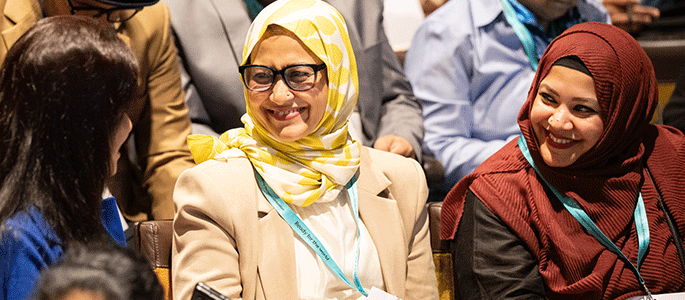26 Jul 2024

On 6 and 7 July, we held our latest global Cambridge Schools Conference at the Perse School in Cambridge, UK. The event gathered more than 350 teachers and school leaders from 120 countries including ministry delegations from Pakistan, Jordan, and Oman.
We were delighted that our communities of schools joined us in person to explore this year’s conference theme ‘Effective communication, from competence to confidence'.
'It almost feels like being back at university, there’s a lot of learning taking place,' said Mrs Goretti Mbabazi, Head of Early Years at Kabojja International School in Uganda. 'We’ve discussed policy and collaboration between teachers, parents, and learners. I speak French and Swahili, so I resonated well with the multilingual session. Effective communication is one thing that everyone should have, if we communicate well and understand each other we will have no conflicts.'
Another participant Dr Vandana Lulla, Director of Podar Group Schools in India explained how ideas shared at the conference would benefit learners. 'Effective communication improves teaching and learning, which in turn, impacts students’ results', she said. 'The first keynote speaker, Professor Neil Mercer very clearly talked about how important communication is in classrooms and spoke wonderfully about strategies we can use in schools to make communication, teaching, and learning more effective.
'In the second keynote session, it was unbelievable to see and hear about multilingualism. Professor Linda Fisher and Dr Karen Forbes explained so beautifully how we all have different accents and come from different parts of the world but can come together with all those differences. They spoke about how we can celebrate every child in the school, their backgrounds, and how this also impacts academic performance.'
Changing landscape of education
In his keynote speech, Dr Rupert Higham, Associate Professor in Education Leadership at University College London (UCL), highlighted the important role of listening in effective communication – particularly in relation to tackling a global issue like climate change: 'The implications and focus on listening and climate change are deep and challenge the very model of education – that smooth path of a great school experience, good grades, elite university, and a stable happy life to come. The proportion of people for whom that will be possible is getting smaller and smaller. That means we must work with schools, children and their parents to offer them the skills and knowledge they need to thrive in the world they have inherited.'
The focus of the conference sessions and dialogues reflects the changing landscape of education, and the call for greater collaboration between communities of schools to co-create teaching and learning approaches that address the competencies that societies need.
Closing the conference, Rod Smith, Group Managing Director of International Education at Cambridge said 'As we look to the future, Cambridge continues to focus its efforts on delivering the high-quality education it has always done, but with a lens on the future of education. We look forward to continuing to work with our global community of school leaders and teachers to help our students be ready for the world.'
Watch the recordings from the keynotes, breakout sessions, and plenary.
You can also read our special conference edition of Cambridge Outlook magazine.